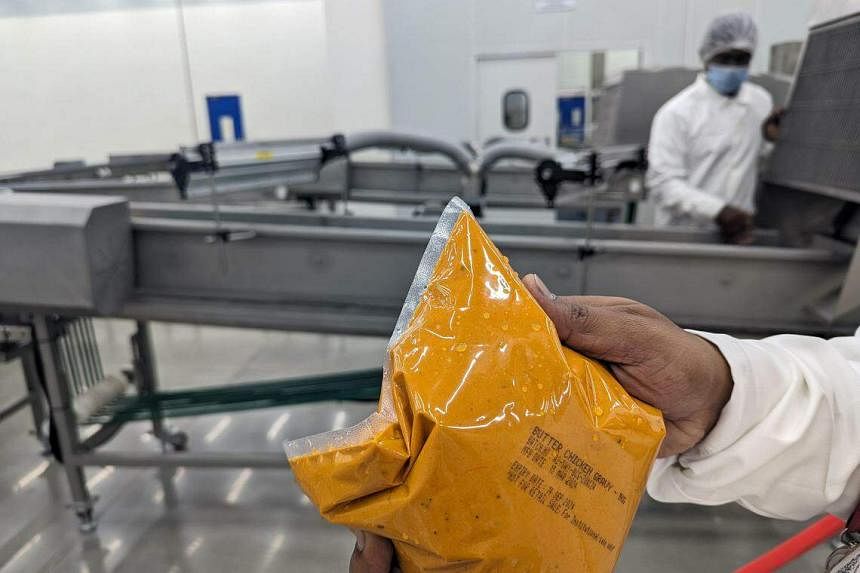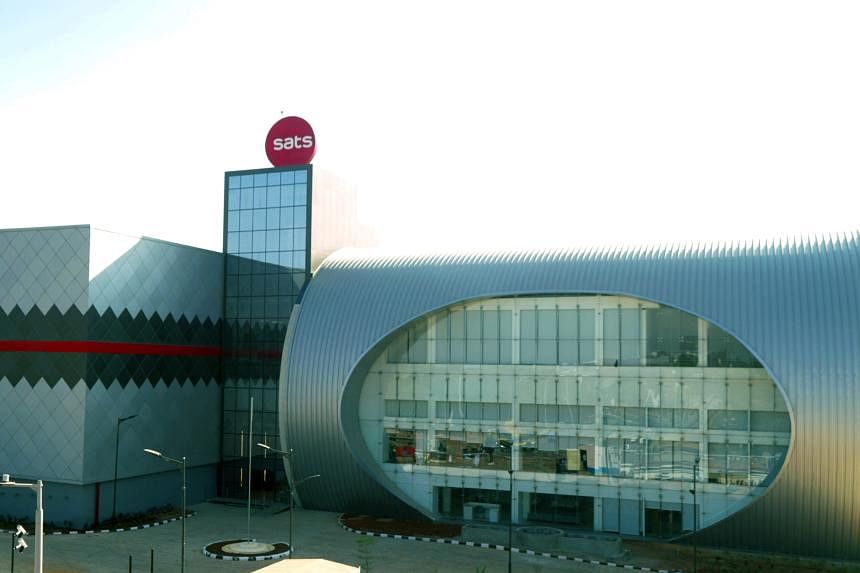BENGALURU – A chef checks a temperature meter as an employee stirs a tonne of cumin in hot oil in a large steel vat. This main ingredient of the Indian dish jeera rice can be poured over a bed of cooked basmati rice only if it has the fragrant, nutty whiff of the Indian tadka – a simple but fussy final step that can go wrong in a minute.
But when the food is prepared in huge volumes, as it is at Singaporean company Sats Food Solutions’ new facility in Bengaluru in southern India, there can be no room for error. So instead of sniffing for authenticity as a home cook will, the chef places his trust on an automatic stove.
The 210,000 sq ft central kitchen in Karnataka state, launched with an investment of $61 million on March 15, is the largest Sats food facility outside Singapore, around 20 per cent larger than its next biggest kitchen in China. It also has facilities in Thailand and Japan.
It has a capacity to make 40 tonnes of food a day, including Indian dishes like jeera (cumin) rice, butter chicken, dal and chicken briyani, and Singaporean dishes such as chilli crab, as well as croissants. The cooked dishes are frozen and packaged as ready-to-eat (RTE) meals.
Sats has made its mark as an airline caterer and logistics provider for five decades.
The frozen food kitchen in India is part of its large-scale food solutions wing that also supplies to non-aviation customers, such as quick-serve restaurants, cloud kitchens, institutions, stores like 7-Eleven, hospitals and food delivery apps.
“We want to disrupt the RTE and ready-to-heat markets in India. A growing number of young, urban Indians want convenience, and being well-travelled and more informed, their expectations about authentic taste are also something we want to meet,” Mr Stanley Goh, chief executive of Sats Food Solutions, told The Straits Times at the launch of the Bengaluru facility.
According to the Ministry of Food Processing Industries (MOFP) in India, 34 per cent of the Indian population, driven by young consumers and millennials, will consume more RTE meals by 2028.
Sats’ own research shows sales of RTE meals in India will grow at a rate of 45 per cent between 2021 and 2026, with a projected total spending of US$64 billion (S$86 billion).
Sats Food Solutions’ first client in India is food delivery giant Swiggy, operational in more than 500 cities and towns across the country and clocking around two million orders a day.
The MOFP study also shows that global demand for Indian RTE foods is outpacing the domestic one. Sats will export at least 15 per cent of the India-made meals to its partner networks doing catering, cargo and logistics around the world.
“Our different customers across aviation and non-aviation sectors want a high diversity of meals – South-east Asian, Chinese, Western and Indian. Who else to make Indian meals than Indians in India?” said Mr Goh.
Mr Sagar Dighe, Sats Food Solutions’ India director, estimates the domestic market to be a potential 300 million users, primarily in cities.
Several brands in the country cater to this market with RTE and quick-to-cook products, such as India’s pioneer of package foods MTR – known for its quick South Indian breakfasts, Khana Khazana curries from a popular television chef and Haldiram’s reheatable meals.
Supermarkets also stock small brands offering hyperlocal dishes.
Mr Dighe said that while there is a growing market for fast meals, “the misconceptions about frozen food as unhealthy or having preservatives” still pose a challenge.

Sats hopes to convince customers by showing that it does not add preservatives and that packaging and freezing at temperatures as low as minus 35 deg C is a way to lock in the nutrition, freshness and taste, he added.
All the cooking in Bengaluru is automated, with machines that dish out 1,000 croissants an hour, another that cleans and chops tonnes of aubergines and a conveyor belt that sends the ready-to-ship packaged butter chicken gravy into a blast freezer where it can be stored for up to a year.
“The chefs we employ do product innovation to convert a single portion recipe into a one-tonne recipe. They programme our machines with this recipe, which will weigh and portion out all ingredients like 5g of salt, and do the cooking,” said Mr Dighe.
Kitchen workers operate only the machines, and load and unload the ingredients and food.
“In India, we joke that if you like the food, don’t look in the kitchen, right? We want to change that low expectation with large-scale automation that ensures a safe and consistent product,” added Mr Dighe.


